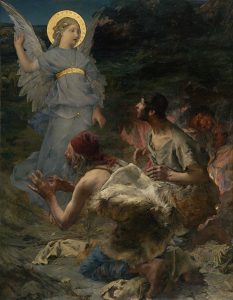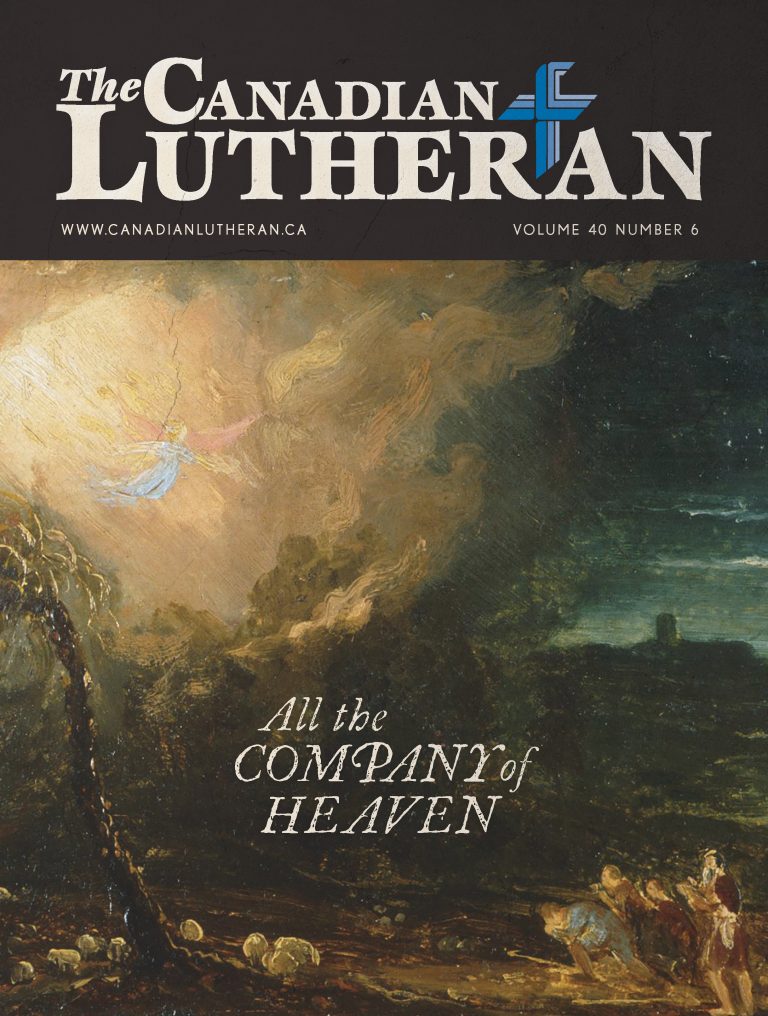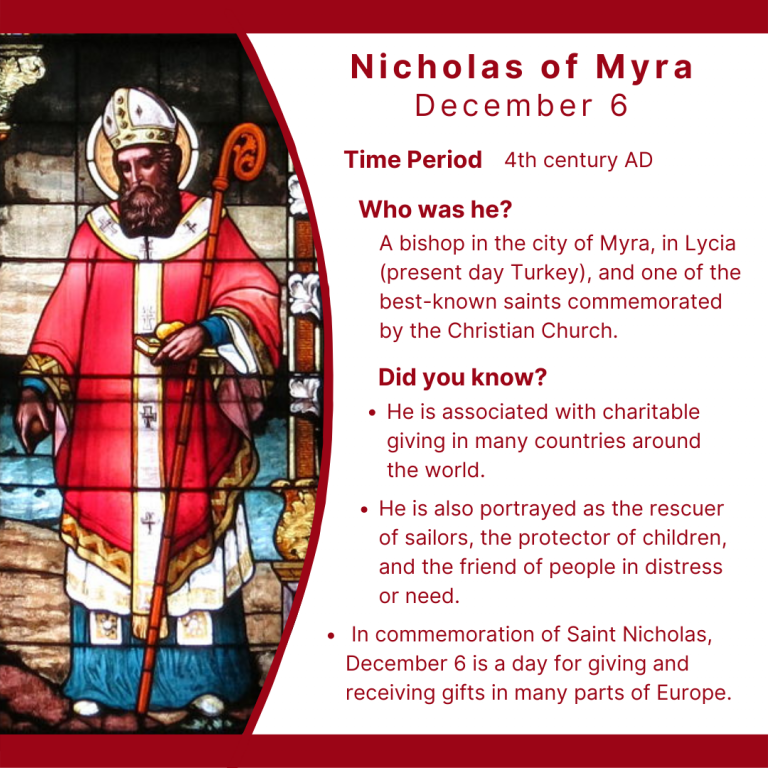A Knife, a Sheepskin, Sandals, and a Flute
Shepherds at Work in the Fields of Bethlehem

The Annunciation to the Shepherds by Jules Bastien-Lepage (1875).
Those shepherds in the fields near Bethlehem were tough guys. Any decent person of the time would have considered them outcasts—on par with thieves and robbers. Nobody wanted to have anything to do with them. So, of course, it is to these people in the fields that the angels first appear. Luther’s words here are most fitting: “This is the first sermon about the newborn little child, our Lord Jesus, that was brought by the angels from heaven to us here on earth.”
What kind of people were those shepherds? I am reminded of four objects that such shepherds may have carried on their person; and they say a lot about those people. And what they tell us is that these shepherds were very much like you and I today.
The Knife
No doubt the shepherds carried a good knife on their belts. After all, a shepherd has to trim the hoofs of the sheep and he has to cut the sticks that close the gate at night. The Evangelist St. Luke writes: “They kept watch over their flock by night” (2:8). Back then, there were still some lions in the region around Bethlehem. And to protect the herd from the attack of lions that raided during the night, you needed at least a knife.
The shepherds were therefore tough guys. They were people who knew how to use knives and clubs well, often even frightening other people. He who is afraid often seeks to frighten others.
What are you afraid of? What makes your jackknife flip open? And how do you frighten others? Somebody once told me that we Germans are often considered to be quite anxious. Was it perhaps this “German angst” that so often caused Germans throughout history to break out their long “knives”? Is there such a thing as “Canadian angst”?
When the angel came to the shepherds, they were very much afraid. Yet the angel proclaims to them the opposite of fear and anxiety; he brings joy and peace. “Fear not, for behold, I bring you good news of great joy that will be for all the people. For unto you is born this day a Saviour…. Glory to God in the highest and on earth peace” (Luke 2:10-11, 14).
The child in the manger, Jesus Christ, brings joy and peace despite the fear and anxiety so prevalent in our time.
The birth of Christ works peace! God Himself makes peace for us by forgiving our sins.
A few weeks ago, we marked the 100th anniversary of the end of World War I. It was the most horrendous war that the world had seen until then. Canadians and Germans opposed each other on the battlefields of Europe as bitter enemies. I am filled with gratitude that this last November the Prime Minister of Canada Justin Trudeau and the German Chancellor Angela Merkel shook hands right there among the war graves.
In 1914, something unusual happened in France. The war was raging in its fifth month; more than a million casualties were already mourned. But on Christmas Eve, the soldiers on both sides simply stopped shooting. For this day, at least, they wanted peace. And the Germans began to sing: “Stille Nacht, heilige Nacht.” On the other side the English called out: “Well done, Fritzen!” and then they began to sing: “O holy night… it is the night of our dear Saviour’s birth.” Then they showed each other their little Christmas trees, and, when nobody was shooting, they dared to come out of their trenches. They exchanged gifts and put up their little Christmas trees for all to see. Later on, in No-Man’s-Land, they played soccer—unbelievable!
The birth of Christ works peace! God Himself makes peace for us by forgiving our sins. In the war this divine peace, for just a brief moment, became visible right there among the knives, the bayonets and the machine guns. This story—it has become known as the “Christmas Peace of 1914”—is not recorded in many documents. The army commands on both sides tried to hush up the event, and they had some difficulty trying to restart the war in January. The units were re-assigned, because many of the men didn’t want to shoot anymore.
For a brief moment in history, the “knives” were put away and peace became a reality.
The Sheepskin
When I think of the shepherds, I also think of sheepskins. For me it’s hard to imagine that the shepherds did not present a soft, warm sheepskin to the Christ child. St. Luke writes: “And they went with haste and found Mary and Joseph, and the baby lying in a manger” (Luke 2:16). It seems likely that the shepherds brought a sheepskin with them, but we can’t know for certain.
But what we do know is the following: Christmas is not about us presenting a gift to the Christ child; instead, the Child presents us with a white, pure sheepskin. For this purpose, Jesus Christ, God’s Son, became man: to give us the gift of the sheepskin of His love and forgiveness. His love for us men is warmer than any sheepskin. His love is so warm that it covers up all your guilt and takes away all your anxiety.
If you are sad during these Christmas holidays—perhaps because you’re alone, or because the festival is not turning out as joyful as you had hoped—then just think of the warm sheepskin of Jesus’ love for you. When others have offended you and you are angry, think of the warm sheepskin of Jesus’ love.
The Sandals
In those days, shepherds wore sandals that consisted of a leather sole tied to the feet by strings. These sandals have some significance for us. After they had witnessed the scene, they the shepherds used these sandals to go out to various people to tell them of that wonderful child in the manger. St. Luke reports: “And when they saw it, they made known the saying that had been told them concerning this child” (2:17).
The sandals are a reminder for us that at some time in the past, somebody did for us what the shepherds did in their day. Somebody brought that same message about the Child in the manger to Germany and to Canada. Let’s hope that these shepherds—the Greek word for shepherd is “pastor”—who first this Christmas message to Canada were wearing winter boots and not sandals! But we really should be grateful for the shepherds’ sandals; they brought us the Christmas message of the wonderful Child in the manger.
St. Mary shows us what we should do with the words of these shepherds: “Mary treasured up all these things, pondering them in her heart” (Luke 2:19). Yes, the sandals of the shepherds are truly important. Speaking of these “sandals” our Confessions say this: “So that we may obtain this faith, the ministry of teaching the Gospel and administering the Sacraments was instituted” (Augsburg Confession, Article 5).
The Flute
No doubt about it: a real shepherd has a real flute. St. Luke the Evangelist proclaims: “The shepherds returned, glorifying and praising God for all they had heard and seen” (Luke 2:20). Yes, I can easily imagine how the shepherds went through the night and played their flutes.
It brings to mind Luther’s words from one of his Christmas sermons: “Having heard a good sermon, sing a joyful hymn.”
Why? Because the child in the manger, Christ Jesus our Lord, takes away our “knives” and grants us eternal peace. Because Jesus Christ grants us His forgiving love, which is white, soft, and warm like a sheepskin. Because He sends shepherds in their sandals to proclaim Christ’s love to this day.
For this reason, we sing and play the flute, we use drums along with violins, trumpets, organs, pianos and our voices to the best of our ability, whether that be in “old Germany” or among “God’s frozen people” in Canada.
Rev. Dr. Hans-Jörg Voigt is Bishop of the Independent Evangelical Lutheran Church in Germany. He is also Chairman of the International Lutheran Council.



